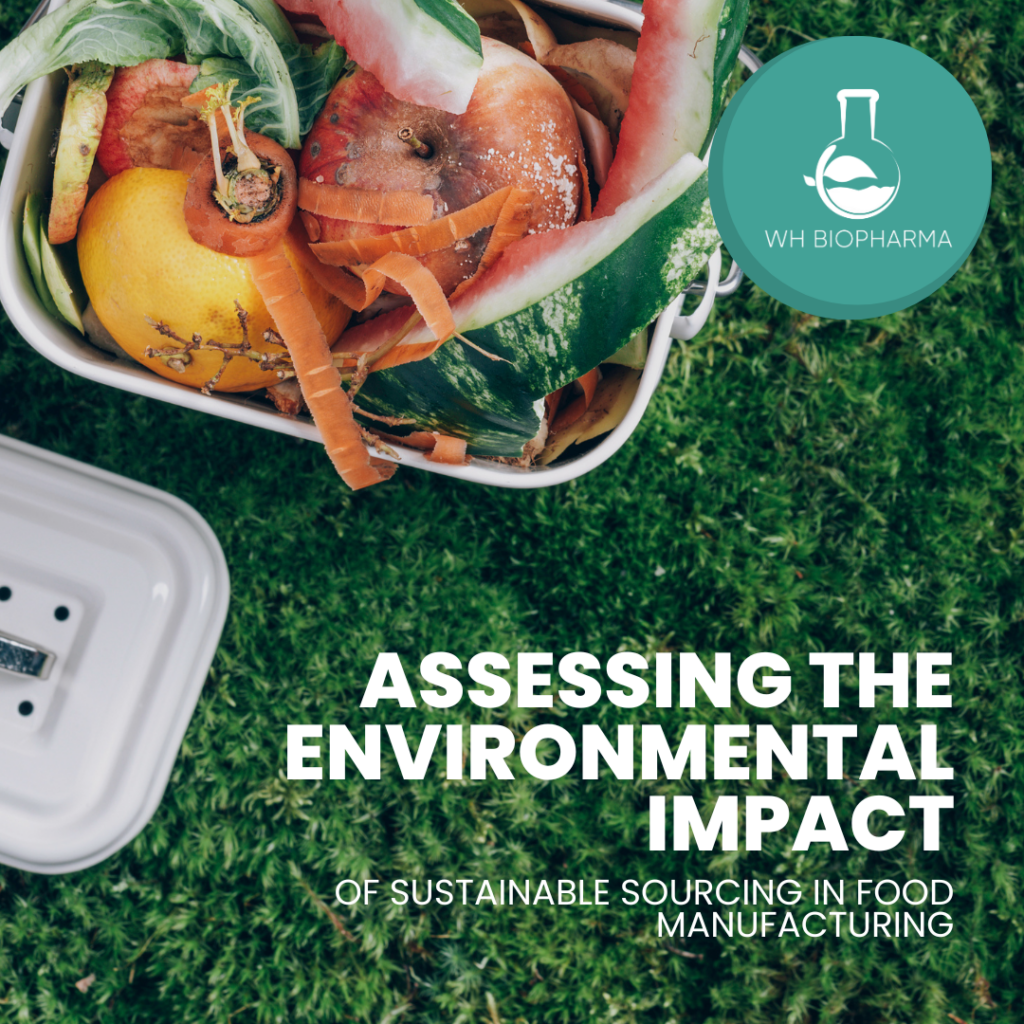In the pursuit of reducing food waste, food manufacturers are increasingly recognizing the importance of sustainable sourcing practices. Responsible ingredient procurement not only promotes environmental stewardship but also plays a crucial role in minimizing food waste throughout the manufacturing process. We will delve into the significance of sustainable sourcing and explore how food manufacturers can leverage responsible ingredient procurement to effectively minimize food waste.
The Impact of Sustainable Sourcing on Food Waste Reduction
Sustainable sourcing involves selecting suppliers and ingredients that prioritize environmental, social, and economic sustainability. By partnering with sustainable suppliers, food manufacturers can ensure the availability of high-quality ingredients and minimize the risk of spoilage or waste. Furthermore, sustainable sourcing practices promote responsible farming and production methods, such as regenerative agriculture, organic farming, and fair trade, which contribute to reduced food waste by prioritizing resource efficiency and minimizing post-harvest losses.
Establishing Strong Supplier Relationships
To effectively minimize food waste through responsible ingredient procurement, food manufacturers must establish strong relationships with their suppliers. Collaboration and open communication are key. By engaging in transparent dialogue, manufacturers can communicate their sustainability expectations, quality standards, and waste reduction goals. This allows suppliers to align their practices accordingly, ensuring the delivery of fresh, high-quality ingredients that meet specific manufacturing requirements, thereby reducing the risk of waste throughout the supply chain.
Embracing Traceability and Transparency
Traceability is essential in sustainable sourcing for food manufacturers. By implementing robust traceability systems, manufacturers can track the journey of ingredients from farm to facility. This enables greater visibility into the supply chain, allowing for early identification of potential quality issues, spoilage risks, or inefficiencies that may lead to food waste. Transparent reporting and documentation further strengthen accountability, ensuring compliance with sustainability standards and promoting responsible practices among suppliers.
Optimizing Inventory Management and Production Planning
Responsible ingredient procurement goes hand in hand with effective inventory management and production planning. By understanding the shelf life and perishability of ingredients, manufacturers can accurately forecast demand, adjust production schedules, and avoid overstocking. Implementing just-in-time inventory management principles helps minimize waste by ensuring that ingredients are utilized efficiently, reducing the risk of spoilage or expiration.
Engaging in Collaborative Product Development
Collaborative product development is a valuable approach to address food waste in the manufacturing industry. By actively engaging with suppliers, manufacturers can explore innovative ways to utilize various parts of ingredients or byproducts that might otherwise be discarded. For example, food manufacturers can collaborate with farmers to incorporate “ugly” or surplus produce into processed foods, thereby reducing waste and expanding product offerings. By fostering a culture of collaboration, manufacturers can identify opportunities for waste reduction and work together with suppliers to create sustainable and value-added solutions.
Implementing Quality Control Measures
Ensuring product quality is essential for minimizing food waste in manufacturing. Implementing robust quality control measures, such as regular inspections, product testing, and adherence to strict quality standards, helps identify and address issues early on. This reduces the likelihood of defective or subpar products reaching consumers, thus avoiding waste resulting from product recalls or customer rejections.
Supporting Circular Economy Initiatives
Embracing circular economy principles is a powerful strategy for reducing food waste in manufacturing. By actively participating in initiatives such as food waste valorization or byproduct utilization, manufacturers can find creative ways to repurpose and transform waste into valuable resources. For instance, food waste can be converted into animal feed, compost, or bioenergy, closing the loop and minimizing waste’s environmental impact while creating additional value.
Educating Consumers and Promoting Responsible Consumption
Lastly, responsible ingredient procurement is closely linked to promoting responsible consumption among consumers. Manufacturers can play a crucial role in educating consumers about the importance of minimizing food waste, offering guidance on proper storage, usage, and disposal of food products. By raising awareness and providing actionable tips, manufacturers can empower consumers to make informed choices, reduce food waste in their own households, and contribute to a more sustainable food system.
Sustainable sourcing and responsible ingredient procurement are integral to minimizing food waste in the manufacturing industry. By selecting suppliers aligned with sustainability principles, establishing strong relationships, and implementing traceability systems, manufacturers can ensure the availability of high-quality ingredients, reduce waste, and promote responsible practices throughout the supply chain. Through collaborative product development, effective inventory management, and quality control measures, manufacturers can further optimize their operations and minimize the risk of waste. By embracing a circular economy mindset and educating consumers, manufacturers can foster a sustainable food system and contribute to a future with reduced food waste and enhanced environmental stewardship.
Assessing the Environmental Impact of Sustainable Sourcing in Food Manufacturing
Assessing the environmental impact of sustainable sourcing in food manufacturing is essential for understanding the effectiveness and benefits of responsible ingredient procurement. By evaluating the environmental footprint of sourcing practices, manufacturers can make informed decisions, track progress, and identify areas for improvement. This subtopic delves into the methodologies, key considerations, and benefits of assessing the environmental impact of sustainable sourcing in food manufacturing.

Life Cycle Assessment (LCA)
Life Cycle Assessment is a widely used methodology for evaluating the environmental impact of products and processes throughout their entire life cycle, from raw material extraction to end-of-life disposal. Conducting an LCA for sourcing practices involves analyzing factors such as greenhouse gas emissions, energy consumption, water usage, and land use. This comprehensive approach enables manufacturers to quantify and compare the environmental impacts of different sourcing strategies, supporting informed decision-making and the identification of hotspots for improvement.
Carbon Footprint
Measuring and reducing carbon footprint is a key aspect of assessing the environmental impact of sustainable sourcing. Carbon footprint represents the amount of greenhouse gas emissions, particularly carbon dioxide (CO2), associated with a product or process. By quantifying the carbon emissions resulting from sourcing practices, manufacturers can identify opportunities to reduce their environmental impact. This can include selecting suppliers with lower emissions, optimizing transportation routes, and promoting local sourcing to minimize the carbon footprint of ingredient procurement.
Water Footprint
Water is a precious resource, and assessing the water footprint of sourcing practices is crucial for sustainable food manufacturing. Water footprint analysis evaluates the total volume of water used, both directly and indirectly, throughout the supply chain. By understanding the water impact of sourcing decisions, manufacturers can implement strategies to minimize water usage, such as water-efficient farming practices, water recycling, or selecting ingredients that require less water-intensive cultivation methods.
Biodiversity and Land Use
Sustainable sourcing considers the impact on biodiversity and land use. Assessing the environmental impact involves evaluating the preservation of ecosystems, protection of endangered species, and responsible land management practices. By sourcing ingredients from suppliers who prioritize biodiversity conservation and employ sustainable land use practices, manufacturers can contribute to preserving natural habitats and mitigating the environmental impact associated with sourcing activities.
Supply Chain Transparency and Certification
To assess the environmental impact effectively, manufacturers should prioritize supply chain transparency and seek certifications that verify sustainable sourcing practices. Certifications such as organic, fair trade, or Rainforest Alliance provide assurance that ingredients are sourced responsibly, meeting specific environmental and social criteria. Manufacturers can partner with certified suppliers, track sustainability indicators, and promote transparency throughout the supply chain, enabling a more accurate assessment of the environmental impact of sourcing practices.
Benefits of Assessing Environmental Impact
Assessing the environmental impact of sustainable sourcing offers several benefits to food manufacturers. Firstly, it provides a clear understanding of the sustainability performance of sourcing practices, allowing manufacturers to set goals, monitor progress, and communicate their efforts to stakeholders. Secondly, it helps identify opportunities for improvement and innovation, encouraging the adoption of more sustainable practices and the development of environmentally friendly supply chains. Lastly, assessing the environmental impact of sourcing practices aligns with consumer demand for transparency and sustainability, enhancing brand reputation and market competitiveness.
Assessing the environmental impact of sustainable sourcing in food manufacturing is a vital step towards reducing the industry’s ecological footprint. Life Cycle Assessment, carbon footprint analysis, water footprint evaluation, and considerations of biodiversity and land use contribute to a comprehensive understanding of the environmental impact. By prioritizing supply chain transparency and certifications, manufacturers can make informed decisions, track progress, and continuously improve their sourcing practices. Ultimately, such assessments enable food manufacturers to minimize their environmental impact, support sustainability goals, and contribute to a more responsible and sustainable food system.





